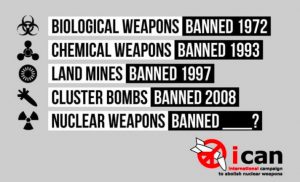
Here is a previous response to this discussion question:
Robin Posted: April 19 2013
I think it was Marx who said that military spending is like throwing money into the sea, since it does not produce anything of value for people.
We could saw this previously in the case of the Soviet Union that was driven into bankruptcy by the arms race, which was a deliberate and successful strategy of NATO.
But now, if we look clearly, we can see it is now the case for the United States which produces very little for export and imports enormously (especially from China), while it spends most of its wealth on arms production.
Arms production is hidden in the official government budget of the United States. First, the government adds in social security which does not come from taxes, but which is simply a form of saving by those who pay into the system. Then it hides much of military spending in other budgets (for example nuclear production is hidden under energy). And finally, it fails to mention that most of the enormous budget item of debt payment is actually the payment for previous wars and arms production.
According to the careful research of the War Resisters League (available as “pie chart flyers” at their website), almost half of the federal budget of the United States is for present and past military expenses. This amounts to over 1.3 trillion dollars a year!
For other previous responses, click here.
The economist Lloyd Dumas provides further analysis as follows in his 2005 article, Bang for the Buck: The Real Effects of Military Spending on Security.
“Apart from the direct effect of military spending on physical security through its role in creating potent military forces, military spending has strong indirect effects on both physical and economic security through its impacts on the macroeconomy. Nineteen years ago, I wrote a book called, The Overburdened Economy (University of California Press, 1986), in which I laid out in great detail a theory of how the deployment of a society’s productive resources set it on a long-term course with powerful implications for the ability of its economy to do what an economy is supposed to do — provide for the material well being of the population as a whole.
“The essence of what I called the “theory of resource diversion” lies in the division of all activities involved in the production and distribution of goods and services into those that further the central purpose of the economy — to provide material well being — and those that do not. . . .
“There is no question that the production of military goods and services is non-contributive activity. Whatever else may be said for such products, they do not add to the present standard of living as consumer goods do, or to the economy’s capacity to produce standard-of-living goods and services in the future, as producer goods do. . . .
“A persistent, large-scale diversion of engineers and scientists and/or capital to economically noncontributive military activity unavoidably reduces their availability to support consumption and contributive investment. . .
“If the theoretical logic we have been following is accurate, the competitiveness problems of domestically based production in the U.S. should be exacerbated over the next decade or two, as the enormous military buildup we are now pursuing re-absorbs that technological talent into noncontributive military activity. . .
“The indirect, long-term effects of sustained high levels of military spending on security are overwhelmingly negative. Such spending not only undermines economic security by, in effect, shrinking the resource base and thus shifting the nation’s production possibilities curve inward, it also undermines physical security by encouraging political and military behavior that provokes reactions which undermine physical security. . .
“Military spending is an economic dead end. High levels of military spending impose a serious opportunity cost even in the short run. In the long run, they undermine the ability of the economy to function efficiently; causing a general decline in economic wellbeing that is exacerbated for most of the population by the determination of the economically privileged and politically powerful to continue to improve their personal economic growth rates in the face of general decline. As militarily powerful but economically deteriorating nations increasingly rely on their military prowess to further their national interests, they provoke reactions by other nations that are likely to reduce physical security as well. In the twenty-first century world, the attempt to achieve security by military means is ultimately counterproductive.”
Mouvement de la Paix: No to the War Economy
USA: Bernie opposes exorbitant defense spending bill
The cost of the global war on terror: $6.4 trillion and 801,000 lives
In bipartisan vote: US House approves record $741 billion military spending bill
BREAKING: TFF Statement – “Convert Military Expenditures To Global Problem-Solving”
USA: New Haven Alders Put Peace On The Ballot
Global military expenditure sees largest annual increase in a decade—says SIPRI
USA: A Department of Actual Defense in a Time of Coronavirus
Former UK Royal Navy Commanders call for nuclear cuts to help address Covid-19 pandemic
USA: Why Is Trump the Only Candidate With a Budget Proposal?
USA: Following Iran Strike, Lockheed Martin and Raytheon Score Huge Defense Contracts
USA: Adding up the Cost of Our Never-Ending Wars
Global arms industry: US companies dominate the Top 100; Russian arms industry moves to second place
Increase in arms transfers driven by demand in the Middle East and Asia, says SIPRI
Augmentation des Transferts d’Armes Tirée par la Demande au Moyen-Orient et en Asie, selon le Sipri
Crecen las Transferencias de Armas por la Demanda de Oriente Medio y Asia, Afirma el SIPRI
Disarm! World Congress 2016 of International Peace Bureau
Move the Money! The Global Campaign on Military Spending
IPB online course: Disarmament for Development
Global Day of Action on Military Spending
Día Mundial de Acción Contra el Gasto Militar
Journée Mondiale d'Action sur les Dépenses Militaire
World military spending falls, but China, Russia’s spending rises, says SIPRI